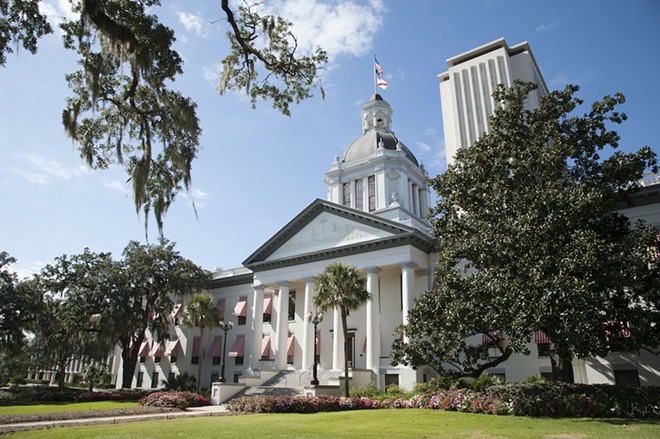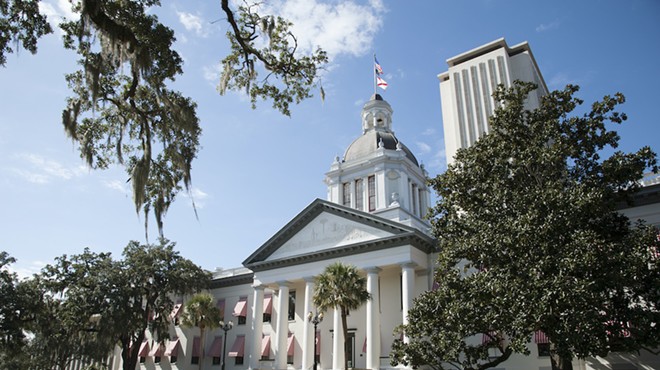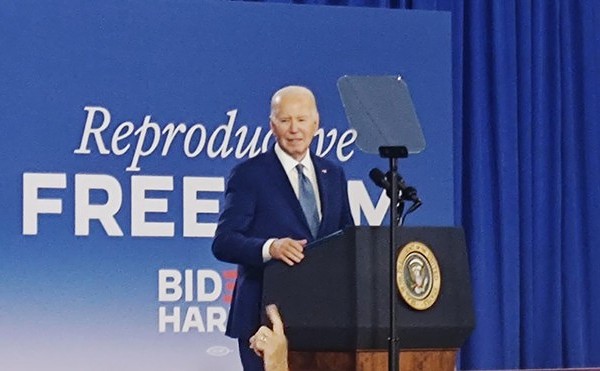With a number of controversial proposals advancing through Florida’s state legislature at a rapid pace, some local elected officials in Florida are sounding the alarm on a slew of preemption bills that they worry would undermine efforts to pursue local solutions to issues affecting their communities.
“We’re having a hard time addressing our residents’ housing needs, how to protect vulnerable populations, getting funding for our public schools or [to] conserve our precious natural resources,” said Joshua Simmons, a Coral Springs commissioner, during a Tuesday press conference.
“These attempts by the legislature to stop us from doing our job makes it hard for us to be who we need to be — to be the public servants that we went out and campaigned for,” Simmons added.
Simmons and other local officials from across the state of Florida shared their concerns during a Tuesday press conference organized by Local Progress to discuss several bills filed during Florida’s 60-day legislative session that would preempt (or prevent) local governments from enacting certain policies that exceed state laws and regulations.
For instance, rent control. Or local policies to help combat climate change.
These bills would, in essence, wrest control from local elected officials — such as city and county commissioners — and give that to the state.
“As Floridians weather the worst affordable housing emergency of our lifetimes, our state legislature has filed multiple bills that will make it even harder for local governments to help our communities keep a roof over their heads,” said Orange County commissioner Emily Bonilla.
One bill, described by local attorney Jay Mobley as “corporate greed disguised as tenant friendly legislation,” would allow landlords and property managers to charge their tenants perpetual non-refundable monthly fees, instead of a refundable upfront security deposit.
Another would prohibit local governments from passing ordinances that bolster tenant protections not already granted to Florida residents under state law.
Protections like a 60-day notice requirement for rent increases above 5%, a ban on discrimination against tenants based on their source of income, a flood disclosure requirement, or something like Orange County’s “Tenants Bill of Rights.”
In Orange County — and other municipalities across the state — that’s something advocates fought hard for.
“It’s hard not to feel paranoid in this position, because it seems like everything we try to do at the local level, the next session, they try to preempt everything,” said Bonilla.

Another bill, SB 102, already signed into law by Florida Gov. Ron DeSantis, prohibits local governments from capping rent increases — a policy more commonly known as “rent control” or “rent stabilization.”
Previously in Florida, implementing rent control was already a complicated, multi-step process that required a local government to first identify (and substantiate) a housing state of emergency and then put rent control up for a vote by residents.
Sound familiar? That’s because Orange County did this last year.
Fifty-nine percent of Orange County voters — over 225,000 residents — voted in favor of a rent stabilization proposal in November that would have, for just one year, capped rent increases to no more than 9.8%.
Think about it: For a $1,200-per-month apartment, that’s $117.60. For a $2,200-per-month apartment, that’s $215.60. Not unreasonable, right?
Unless you’re the Florida Apartment Association or the Florida Realtors — two trade groups that sued the county over the rent cap proposal, blocking it from going into effect.
The Florida Realtors, for its part, celebrated SB 102’s passage.
Now, under state law, pursuing any kind of rent control in Florida is out of the question.
For local elected officials and politicians, that ban (slipped into a broader affordable housing bill like some sort of poison pill) feels targeted.
“These bills just add insult to injury,” said Bonilla, who was a vocal proponent of Orange County’s rent stabilization proposal. “The bottom line here is that local governments are closest to the communities. We know far better than the state what support our communities need to stay housed.”
A Local Progress poll, conducted last year, found bipartisan support for limiting rent increases — with 8 out of 10 Florida voters polled saying they agreed with the idea.
Florida was the nation’s fastest-growing state last year, according to data from the U.S. Census Bureau. A grim combination of high demand, a lack of available supply, and corporate greed disrupting the housing market has led to skyrocketing rent prices over the last two years, and there's not enough safe, affordable housing to go around.
“As Floridians weather the worst affordable housing emergency of our lifetimes, our state legislature has filed multiple bills that will make it even harder for local governments to help our communities keep a roof over their heads”
tweet this
Beyond housing
But it’s not just proposals that could blunt local elected officials’ attempts to find solutions to Florida’s housing crisis that have them worried.
House Bill 1617, for instance, would prevent local governments from getting public funds to issue community identification.
According to Coral Springs Commissioner Nancy Metayer Brown, being able to receive a community ID “is critical” for Floridians who do not have the necessary requirements to receive a state-issued ID card or driver's license — such as some formerly incarcerated people and undocumented immigrants.
House Bill 1, an education proposal already signed into law by Gov. DeSantis, could undercut Florida’s public schools, according to critics, and it could cost local school districts. The bill expands Florida’s school voucher program, allowing school children of all income levels to receive taxpayer-funded vouchers that could be used to pay for private school tuition.
The Florida Policy Institute, a progressive think tank, estimates the universal voucher program could cost the state $4 billion.
Another bill would essentially prohibit local policy for more resilient buildings or home energy improvements, while yet another would undermine local attempts to improve water quality or prevent pollution, according to Alissa Jean Schafer, a former Broward County Soil & Water Conservation supervisor.
“Pollution, we know generally, is not just a blanket thing that covers an entire state all at once. It happens usually in very localized instances,” said Schafer, in explanation of the bill’s potential impact. “So to have a bill that would literally handcuff the people that are close to the pollution from doing anything about what is happening to the waterways, for example, in their own neighborhoods is absolutely ridiculous,” she added, calling these bills “political theater.”
Lastly, another big preemption bill would allow businesses to sue local governments for up to $50,000 for passing local ordinances that are “arbitrary or unreasonable” and which harm business owners’ bottom line.
That could include local regulations on things such as noise, vacation rentals, the use of single-use plastics, as well as worker protection policies.
“It’s so broad is the biggest concern — like, it essentially can capture everything,” said Francesca Menes, deputy organizing director for Local Progress.
A similar proposal was passed by the state legislature and vetoed by DeSantis last year.
This year's version is a "compromise bill," according to Menes.
With about one month left in Florida's 2023 legislative session, several of these bills are advancing through Florida’s legislature or have already reached Gov. DeSantis' desk for his signature.
That's in no small part due to the fact that Florida's legislature is now controlled by a supermajority of Republicans, who are now capable of streamlining their legislative priorities.
It's not a level playing field for Democrats, or for general critics of Republican-sponsored bills that are gaining traction.
Still, local elected officials who are worried about the impact this could have on their ability to serve their communities effectively — with Big Government stepping in to tell them what they can and cannot do — say they’re not going down without a fight.
“We’re gonna keep … you know, ringing the alarm bells,” said Coral Springs Commissioner Joshua Simmons. “We really want people to understand where everything is happening and why sometimes it is so difficult for us to do the job that we were voted to do.”






















